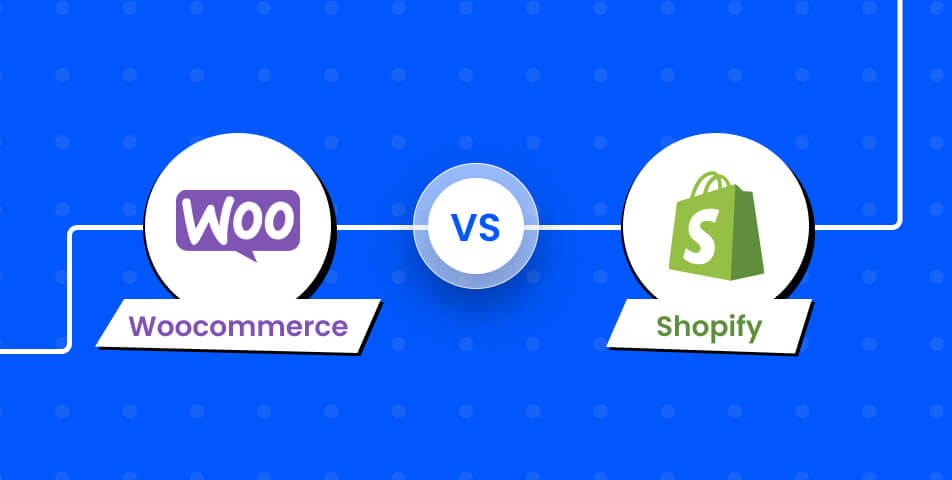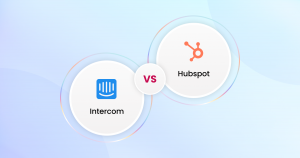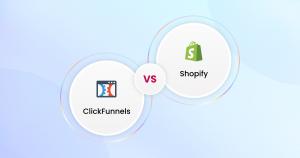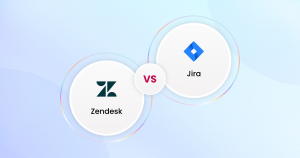Picture yourself navigating a vibrant marketplace, where every platform lures you in with the prospect of triumph. WooCommerce and Shopify emerge as pillars in the realm of e-commerce for small to medium-sized enterprises, each boasting unique strengths and attractions.
Opting for one over the other could determine the path of your digital store, impacting its expansion and effectiveness. Hence, which platform is the catalyst for unlocking your business’s ultimate capabilities?
Shopify vs WooCommerce: Which Ecommerce Platform is Better?
When choosing between Shopify and WooCommerce for your e-commerce platform, it’s important to consider the advantages each platform offers based on your business requirements.
WooCommerce, being open source, provides extensive customization options, whereas Shopify, being fully hosted, offers a more user-friendly interface.
If you prioritize complete control and customization, WooCommerce may be the preferred option. On the other hand, if you value ease of setup and user-friendliness, Shopify might be the more suitable choice.
WooCommerce vs Shopify: An Overview
When comparing WooCommerce and Shopify, it’s essential to grasp the fundamentals.
WooCommerce is an open-source plugin for WordPress that enables limitless customization, while Shopify is an all-in-one e-commerce solution with a straightforward interface.
Understanding the key distinctions between these platforms will assist you in making a well-informed decision for your online business.
What is WooCommerce?
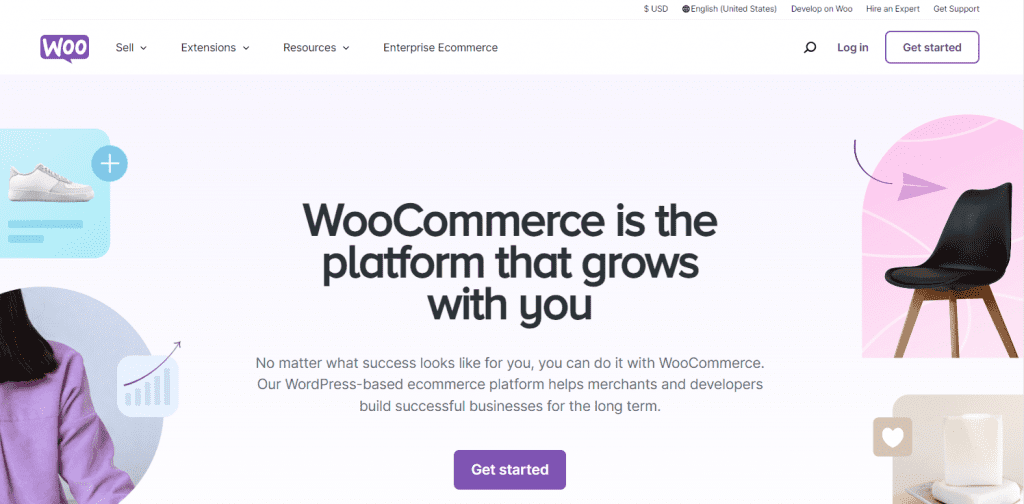
WooCommerce, an open-source e-commerce plugin for WordPress, is a versatile and powerful platform that has attracted over 6.2 million users since its inception in 2011.
- It seamlessly integrates with the WordPress CMS.
- It powers 28% of e-commerce-enabled websites.
- It offers extensive customization options.
- It’s well-suited for small to medium-sized online stores.
What is Shopify?

Shopify, a fully hosted eCommerce platform, provides a comprehensive solution for businesses wanting to set up an online store easily and securely. It acts as a hosted platform, streamlining the setup process by incorporating essential services such as hosting and SSL certificates.
With Shopify, businesses can swiftly launch their online stores with a user-friendly interface and automatic data protection, making it an ideal option for those in search of an all-inclusive e-commerce solution.
Comparision of WooCommerce vs Shopify
When evaluating WooCommerce and Shopify for your e-commerce needs, take into account factors such as ease of use, available eCommerce features, plugins and extensions, shipping and payment gateways, as well as marketing and SEO capabilities.
WooCommerce provides extensive customization options with complete control over your store, while Shopify offers a user-friendly interface and professionally designed templates tailored for different industries.
Both platforms have their own strengths, so assessing these aspects can assist you in making a well-informed decision based on your specific business requirements.
WooCommerce vs Shopify: Ease of Use
When choosing between WooCommerce and Shopify for your e-commerce requirements, consider the ease of use provided by each platform.
WooCommerce offers extensive customization options but demands additional technical expertise and ongoing maintenance.
Conversely, Shopify’s intuitive interface and step-by-step setup process make it a convenient option for users in search of a simple and effective e-commerce solution.
WooCommerce
For businesses in search of an e-commerce platform that allows for extensive customization but requires some online development knowledge, WooCommerce could be a great option.
- Highly Customizable: Tailor your WooCommerce store to align perfectly with your brand.
- Seamless WordPress Integration: Enjoy smooth integration with WordPress and WooCommerce.
- Wide Range of Themes: Select from a diverse collection of WooCommerce themes to create a unique look.
- Flexible Hosting Options: Choose the hosting solution that best meets the needs of your WooCommerce store.
Shopify
Shopify simplifies the initial setup process for e-commerce businesses by bundling hosting and domain services, making it easier for beginners compared to WooCommerce. Small businesses can save time and effort with Shopify, streamlining the setup process. The convenience of having essential components bundled in Shopify’s subscription makes it ideal for quick store launches.
Shopify’s user-friendly approach caters well to small businesses seeking a hassle-free start to their online store.
WooCommerce vs Shopify: eCommerce Features
When comparing WooCommerce and Shopify for e-commerce features, WooCommerce offers:
- Extensive customization options
- Support for over 80 payment gateways
This provides flexibility for business needs.
In contrast, Shopify features:
- A user-friendly interface
- Step-by-step setup guidance
- 24/7 customer service support
This prioritizes ease of use and assistance for users.
These distinct features cater to different preferences, allowing businesses to choose based on their specific requirements.
WooCommerce
WooCommerce, an e-commerce plugin for WordPress, provides small to medium-sized businesses with a wide range of customization options for their online stores.
- WooCommerce is a no-cost plugin, which is budget-friendly for startups.
- WooCommerce is an open-source tool, enabling extensive customization.
- WooCommerce users have access to 80 payment gateways, offering flexibility.
- WooCommerce integrates smoothly with WordPress, streamlining content management.
Shopify
Shopify provides over 100 professionally designed templates, inventory management, versatile shipping options, and email marketing tools.
It excels in sales features and offers 24/7 support, making it a comprehensive choice for small to medium-sized e-commerce businesses seeking convenience and efficiency.
WooCommerce vs Shopify: Plugins and Extensions
When it comes to plugins and extensions, WooCommerce provides over 60,000 options, enabling extensive customization. On the other hand, Shopify’s app store offers a range of extensions for various functions.
Moreover, WooCommerce features 300+ extensions in its Marketplace to enhance functionality, while Shopify’s Theme Store provides over 100 themes for customization through CSS editing.
Both platforms offer a diverse selection of plugins and extensions to personalize the online store according to individual requirements.
WooCommerce
With more than 60,000 free and freemium plugins to choose from, WooCommerce provides a wide range of customization options for e-commerce businesses.
- WooCommerce is a WordPress plugin, offering flexibility in design.
- As a self-hosted platform, WooCommerce gives you full control over your online store.
- WordPress and the WooCommerce plugin are compatible with all WordPress themes.
- WooCommerce hosting plans enable you to customize your hosting according to your specific requirements.
Shopify
Shopify’s Theme Store offers a wide range of over 100 premium and free themes for e-commerce businesses. These themes can be easily customized through CSS personalization.
The Shopify App Store also provides numerous extensions and applications to enhance the functionality of your online store. With Shopify’s intuitive interface and extensive plugin options, you can efficiently tailor your store to meet specific business requirements.
WooCommerce vs Shopify: Shipping and Payment Gateways
When it comes to shipping and payment gateways, WooCommerce provides a wide array of options with 80 payment gateways and robust shipping management capabilities.
In contrast, Shopify simplifies the process by directly linking to the owner’s bank account for payments and offering versatile shipping options for online stores.
Both platforms focus on simplifying the checkout process for customers and meeting diverse business requirements, making them viable options for e-commerce businesses.
WooCommerce
WooCommerce provides online store owners with the freedom to connect with more than 80 payment gateways and a variety of shipping methods to meet the needs of their customers effectively.
The platform seamlessly integrates with over 80 payment gateways, supports various shipping methods, offers a range of shipping carriers, and enables smooth order processing with popular solutions.
Shopify
For e-commerce businesses looking for a comprehensive approach to shipping and payment gateways, delving into the features of Shopify can provide a holistic solution.
WooCommerce vs Shopify: Marketing and SEO
When it comes to marketing and SEO, WooCommerce offers extensive SEO tools and plugins integrated with WordPress, allowing for in-depth optimization strategies.
Shopify, on the other hand, provides built-in SEO features like customizable title tags and meta descriptions to enhance search engine visibility.
Both platforms offer unique marketing tools: WooCommerce focuses on content marketing and social media integration, while Shopify provides email marketing features and abandoned cart recovery to boost sales.
WooCommerce
With robust SEO tools and seamless WordPress integration, enhancing your online visibility and Google rankings becomes easily attainable with WooCommerce.
- Extensive Customization: Customize your marketing tactics to align with your business requirements.
- Advanced SEO Strategies: Employ sophisticated techniques to enhance search engine rankings.
- Personalized Marketing Initiatives: Develop tailored campaigns to reach specific target audiences.
- Seamless WordPress Integration: Integrate smoothly with WordPress for a unified online presence.
Shopify
Shopify improves e-commerce businesses’ marketing and SEO capabilities with its user-friendly built-in features and tools. It offers customizable title tags and meta descriptions, automatic sitemap generation, and mobile responsiveness to enhance SEO performance.
WooCommerce provides comprehensive SEO tools through WordPress plugins like Yoast SEO, enabling detailed SEO optimization. Both platforms strive to increase visibility on search engines for your online store on these leading e-commerce platforms.
WooCommerce vs Shopify: Security
When it comes to security, Shopify offers built-in features like SSL certificates, fraud detection, and 2-step authentication for enhanced protection.
In contrast, WooCommerce requires manual setup of security measures such as SSL certificates and plugins.
Shopify’s PCI-DSS compliance and robust security features provide a more secure environment compared to WooCommerce, making it a convenient choice for businesses prioritizing security.
WooCommerce
For e-commerce businesses looking to enhance security measures, WooCommerce doesn’t include built-in SSL certificates. Users must manually add SSL certificates and install security plugins for increased website security. This places the responsibility of website security on the user.
There are various security plugins available that users can leverage for additional protection.
Shopify
Shopify simplifies security by providing built-in SSL certificates, fraud detection, and 2-factor authentication, enhancing its security protocols. Its PCI-DSS compliance ensures comprehensive protection for your e-commerce store, distinguishing it from WooCommerce.
With Shopify, you can avoid the hassle of manually adding security measures, making it a convenient option for small to medium-sized businesses focused on safeguarding customer data.
Some Quick Insights
With the rapid growth of e-commerce businesses, gaining quick insights into the differences between WooCommerce and Shopify is crucial for making informed decisions about your online store platform.
- WooCommerce is highly popular: it powers over 28% of e-commerce-enabled websites.
- Shopify pricing starts at $29 per month: making it a user-friendly solution.
- Shopify provides: 24/7 support, easy setup, and robust security features.
- WooCommerce is an excellent choice: being a free plugin for WordPress.
Best for Pricing: WooCommerce
When it comes to pricing for your e-commerce business, WooCommerce shines as a budget-friendly choice with its no-cost platform and adaptable pricing tailored to your requirements.
You’ll enjoy the freedom to select extra features and extensions, although be aware that these may come with additional charges.
Transaction fees and processing fees will fluctuate based on the payment gateways you opt for, so it’s essential to include them in your budget planning for a clear understanding of costs.
Transaction Fees
Choosing WooCommerce over Shopify can result in significant cost savings since WooCommerce doesn’t impose any transaction fees. This is particularly advantageous for small to medium-sized businesses looking to maximize their online revenue.
In contrast, Shopify applies transaction fees ranging from 2.0% to 0.5%, which can have a notable impact on profit margins. By opting for WooCommerce, businesses can retain more of their earnings, making it a more cost-effective choice for budget-conscious entrepreneurs.
Free Trials
For budget-conscious entrepreneurs exploring e-commerce platforms, WooCommerce’s free trial offers a cost-effective opportunity to test features and functionalities without immediate financial commitments.
Unlike Shopify, which mandates monthly fees starting at $29, WooCommerce’s free trial provides a budget-friendly option for small to medium-sized businesses.
This allows you to thoroughly evaluate WooCommerce before making any financial decisions, making it an ideal choice for those looking to control initial expenses.
WooCommerces flexible pricing
You can take advantage of WooCommerce’s adaptable pricing system, designed to accommodate different e-commerce requirements and financial considerations.
- WooCommerce pricing options range from $4 to $480 per month.
- Transaction fees fluctuate depending on the selected payment gateways.
- Affordable hosting solutions such as Bluehost are available starting at $6.99 per month.
- WooCommerce’s cost-effectiveness is evident, making it an efficient choice for managing expenses.
Best for Setting Up: Shopify
Shopify’s editor is user-friendly and efficient, making it easy to set up your store quickly.
The platform simplifies the process by combining hosting, domain selection, and setup in one convenient place.
For small to medium-sized e-commerce businesses, Shopify’s out-of-the-box solution offers a straightforward way to launch your online store without technical complexities.
Shopifys easy-to-use editor allows you to set up your store fast
Setting up your online store quickly is effortless with Shopify’s user-friendly editor. You can easily customize your store without technical expertise, making it ideal for small to medium-sized e-commerce businesses.
Shopify’s intuitive interface ensures efficient product listings, seamless payment gateway integration, and smooth order management. Take advantage of Shopify’s streamlined setup process to save time and effort as you establish your online presence.
Best for Themes: Shopify
Shopify offers a diverse selection of over 70 free and paid themes designed to cater to various industries, ensuring that you can find a theme that perfectly complements your e-commerce business. These themes aren’t only visually appealing but also mobile responsive and easy to implement, streamlining the process of setting up your online store.
With practical features like mega menus and stock counters readily available in Shopify’s themes, you can effortlessly create a professional and functional e-commerce website.
Shopify’s responsive and sleek templates
When looking for themes that are both responsive and sleek for your e-commerce business, Shopify emerges as a top choice.
Shopify templates provide easy-to-use customization options, elevating your online presence effortlessly.
The designs are visually appealing and optimized for mobile devices, guaranteeing a smooth shopping experience.
With Shopify’s modern and polished themes, you can effortlessly craft an online store that connects with your target audience.
Best for Sales Features: Shopify
When it comes to sales features, Shopify excels with its versatile shipping options, multiple payment methods, and integrated inventory management tools.
The user-friendly interface simplifies sales management, providing functions like order tracking and customer profiles.
Furthermore, built-in display and marketing tools like Collections and gift cards contribute to boosting sales for e-commerce businesses.
Inventory
For businesses seeking robust sales features and streamlined inventory management, one platform stands out as a top choice. Shopify excels in inventory management features, offering product variants, stock level alerts, and user-friendly interfaces for efficient control.
Its sales features include low stock notifications and bulk editing capabilities. With Shopify, handling backorders and managing multiple warehouses is seamless.
Shipping Options
Shopify offers a range of shipping options to e-commerce businesses, boosting sales features and simplifying order processing. The platform provides advanced tools such as order tracking, automated order fulfillment, and shipping label printing to streamline shipping management.
With multi-location inventory support, businesses can fulfill orders from different warehouses, enhancing the overall customer experience. Integration with leading carriers further optimizes the shipping process, ensuring a seamless customer journey.
Which is better: WooCommerce or Shopify?
If you prioritize full control, customization, and scalability in your online store, WooCommerce emerges as the superior choice compared to Shopify for e-commerce businesses.
- WooCommerce provides an abundance of customization options.
- Shopify excels in its user-friendly setup.
- WooCommerce is unmatched in terms of scalability.
- Shopify offers integrated features tailored to small to medium-sized businesses.
What is the difference between WooCommerce and Shopify?
When comparing WooCommerce and Shopify, the key difference lies in their approach to customization and technical simplicity.
WooCommerce, an ecommerce plugin for WordPress, offers high customization and flexibility.
On the other hand, Shopify simplifies the technical aspects with its all-in-one e-commerce solution.
Additionally, Shopify provides streamlined setup processes and enhanced security features, making it a popular choice for businesses looking for a user-friendly ecommerce solution.
WooCommerce vs Shopify: which is better for security?
For optimal security in your e-commerce business, compare the security features of WooCommerce and Shopify.
- Shopify provides SSL certificates, fraud detection, and 2-factor authentication for heightened security.
- WooCommerce necessitates manual incorporation of security measures such as SSL certificates and plugins for ensuring protection.
- Shopify adheres to PCI-DSS compliance, ensuring stringent security standards for online transactions.
- Shopify offers a more secure environment by automatically managing crucial security measures.
Which has the best uptime: WooCommerce or Shopify?
When considering WooCommerce and Shopify, uptime performance is a crucial aspect for maintaining consistent access to your online store.
Shopify excels with an impressive 99.98% average uptime, thanks to its cloud-based infrastructure.
WooCommerce’s uptime depends on the hosting provider, with some guaranteeing 99.9% or better.
Both platforms prioritize uptime, underscoring the importance of monitoring uptime metrics and choosing reliable hosting services for a secure online presence.
Which is cheaper to run: Shopify or WooCommerce?
Shopify’s pricing plans have a clear structure, starting at $29 per month, making it a more cost-effective option for businesses aiming to streamline expenses. WooCommerce, on the other hand, has fluctuating costs depending on the extensions and hosting services chosen.
Additionally, Shopify includes hosting services and SSL certificates in all plans, whereas WooCommerce may have lower base fees but entails additional expenses. It’s important to note that Shopify charges transaction fees ranging from 2.0% to 0.5%, which should be considered when comparing the overall costs of running an online store using either platform.
Which is better for ecommerce: Shopify or WooCommerce?
To decide on the optimal e-commerce platform for your business requirements, weigh the distinct advantages and features provided by WooCommerce and Shopify.
WooCommerce caters to small to medium-sized businesses looking for control, customization, and scalability.
Shopify is perfect for individuals seeking a user-friendly, comprehensive solution with easy setup and robust support.
The decision between Shopify and WooCommerce hinges on considerations such as technical proficiency and growth objectives for small to medium-sized businesses in 2024.
Which is better: Shopify POS or WooCommerce POS?
For businesses looking for a user-friendly and integrated point-of-sale solution, comparing WooCommerce POS and Shopify POS can provide valuable insights for streamlining retail operations.
- WooCommerce POS: A free plugin that seamlessly integrates with WooCommerce.
- Shopify POS: A dedicated system that syncs with Shopify’s online platform.
- Inventory Management: Provided by both systems.
- Order Processing & Customer Data Synchronization: Features available in both platforms.
What’s the best commerce platform for you?
When choosing the perfect e-commerce platform for your business, carefully consider your specific needs and objectives. Shopify stands out as a cost-effective choice for small to medium-sized businesses, offering a streamlined setup process and reliable support. On the other hand, WooCommerce is ideal for businesses that desire extensive customization options and greater control over their online store. Evaluate both platforms to determine which aligns best with your requirements.
| Shopify | WooCommerce |
|---|---|
| Cost-effective | Customization |
| User-friendly | Control |
| All-in-one | Extensive options |







